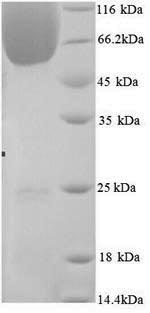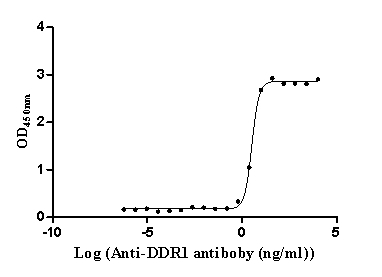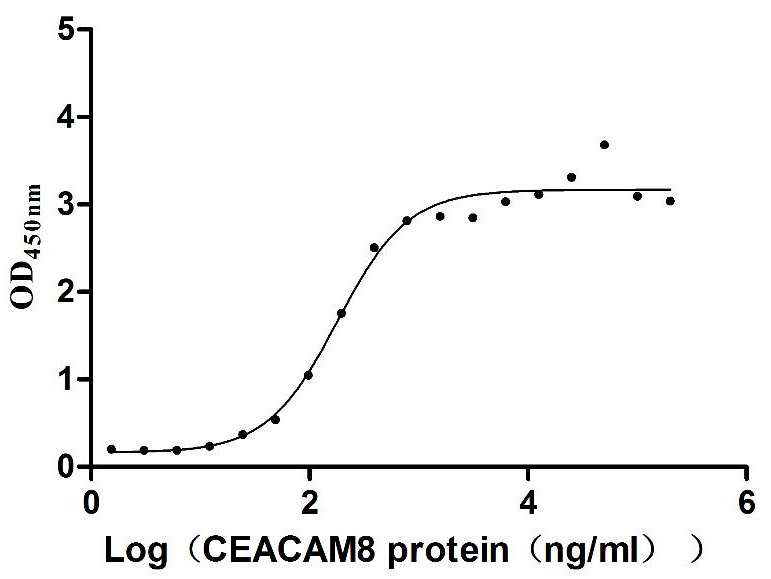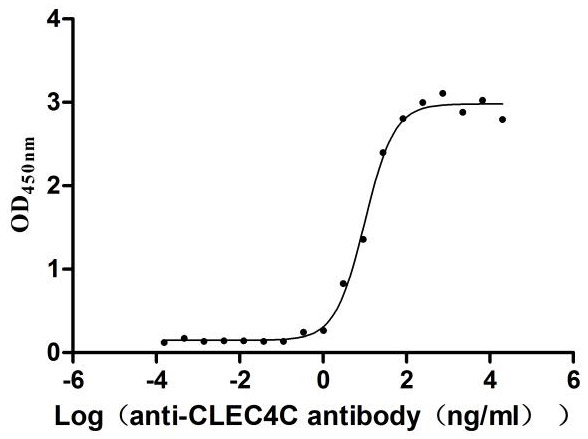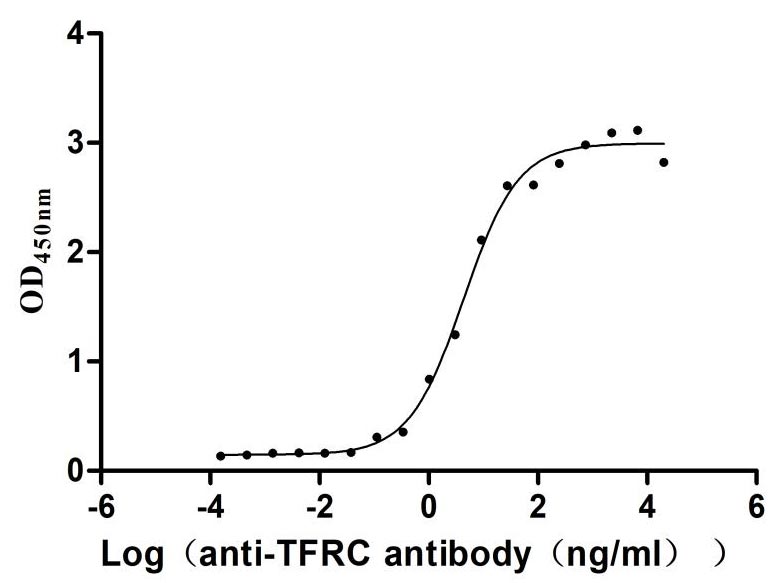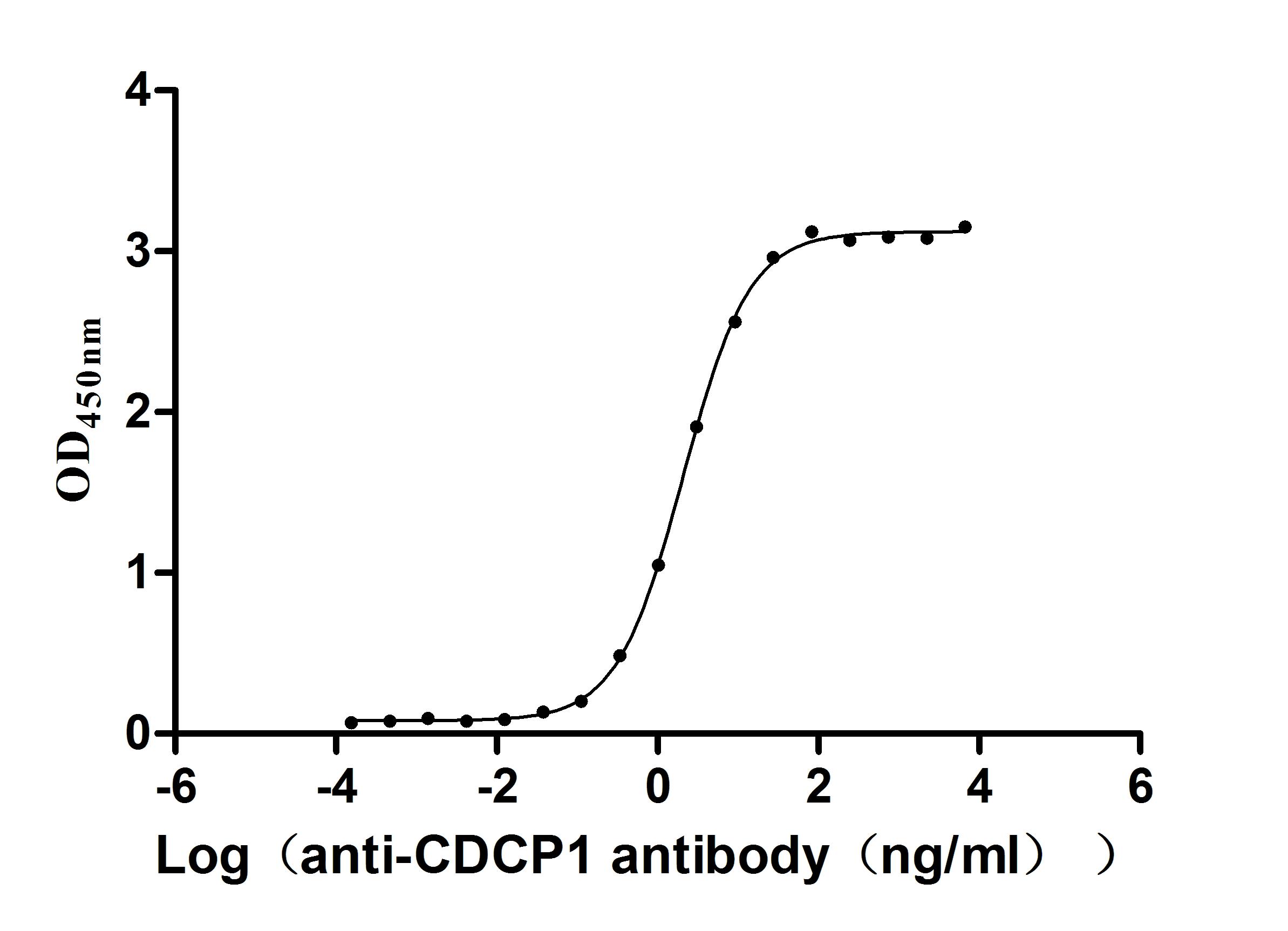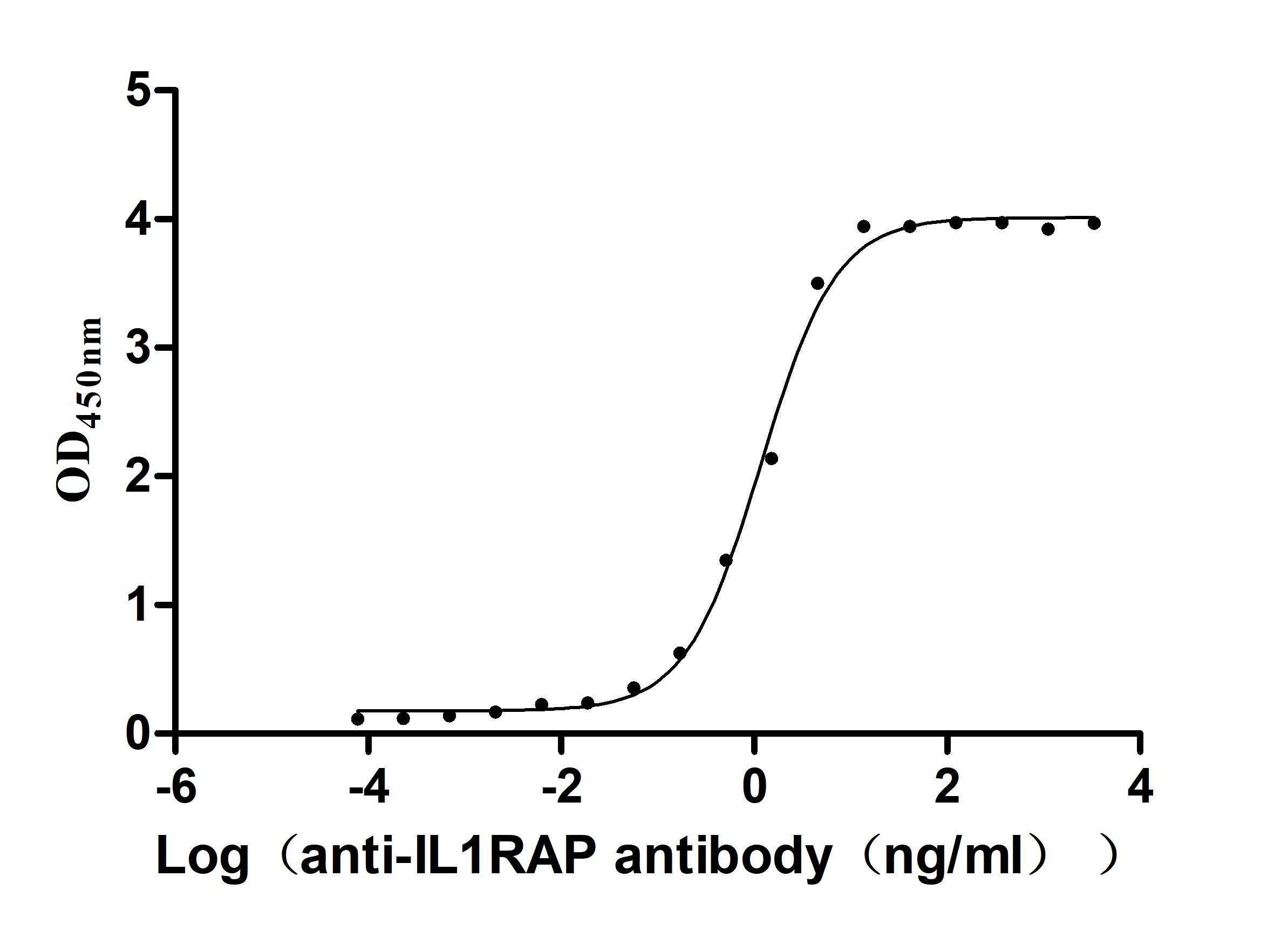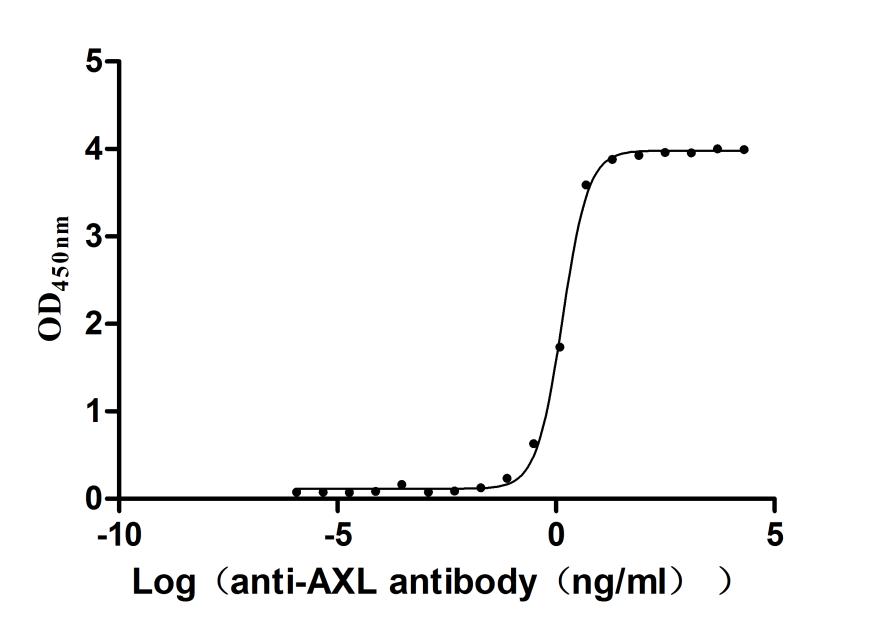Recombinant Mouse BAG family molecular chaperone regulator 3 (Bag3)
In Stock-
中文名称:Recombinant Mouse BAG family molecular chaperone regulator 3(Bag3)
-
货号:CSB-YP864372MO
-
规格:¥1836
-
图片:
-
其他:
产品详情
-
纯度:Greater than 90% as determined by SDS-PAGE.
-
基因名:Bag3
-
Uniprot No.:
-
别名:Bag3; Bis; MNCb-2243BAG family molecular chaperone regulator 3; BAG-3; Bcl-2-associated athanogene 3; Bcl-2-binding protein Bis
-
种属:Mus musculus (Mouse)
-
蛋白长度:Full Length of Mature Protein
-
来源:Yeast
-
分子量:63.7kDa
-
表达区域:2-577aa
-
氨基酸序列SAATQSPMMQMASGNGASDRDPLPPGWEIKIDPQTGWPFFVDHNSRTTTWNDPRVPPEGPKDTASSANGPSRDGSRLLPIREGHPIYPQLRPGYIPIPVLHEGSENRQPHLFHAYSQPGVQRFRTEAAAATPQRSQSPLRGGMTEAAQTDKQCGQMPATATTAAAQPPTAHGPERSQSPAASDCSSSSSSASLPSSGRSSLGSHQLPRGYIPIPVIHEQNITRPAAQPSFHQAQKTHYPAQQGEYQPQQPVYHKIQGDDWEPRPLRAASPFRSPVRGASSREGSPARSGTPVHCPSPIRVHTVVDRPQPMTHREPPPVTQPENKPESKPGPAGPDLPPGHIPIQVIRREADSKPVSQKSPPPAEKVEVKVSSAPIPCPSPSPAPSAVPSPPKNVAAEQKAAPSPAPAEPAAPKSGEAETPPKHPGVLKVEAILEKVQGLEQAVDSFEGKKTDKKYLMIEEYLTKELLALDSVDPEGRADVRQARRDGVRKVQTILEKLEQKAIDVPGQVQVYELQPSNLEAEQPLQEIMGAVVADKDKKGPENKDPQTESQQLEAKAATPPNPSNPADSAGNLVAP
Note: The complete sequence including tag sequence, target protein sequence and linker sequence could be provided upon request. -
蛋白标签:N-terminal 6xHis-tagged
-
产品提供形式:Liquid or Lyophilized powder
Note: We will preferentially ship the format that we have in stock, however, if you have any special requirement for the format, please remark your requirement when placing the order, we will prepare according to your demand. -
缓冲液:Tris-based buffer,50% glycerol
-
储存条件:Store at -20°C/-80°C upon receipt, aliquoting is necessary for mutiple use. Avoid repeated freeze-thaw cycles.
-
保质期:The shelf life is related to many factors, storage state, buffer ingredients, storage temperature and the stability of the protein itself.
Generally, the shelf life of liquid form is 6 months at -20°C/-80°C. The shelf life of lyophilized form is 12 months at -20°C/-80°C. -
货期:3-7 business days
-
注意事项:Repeated freezing and thawing is not recommended. Store working aliquots at 4°C for up to one week.
-
Datasheet & COA:Please contact us to get it.
相关产品
靶点详情
-
功能:Co-chaperone for HSP70 and HSC70 chaperone proteins. Acts as a nucleotide-exchange factor (NEF) promoting the release of ADP from the HSP70 and HSC70 proteins thereby triggering client/substrate protein release. Nucleotide release is mediated via its binding to the nucleotide-binding domain (NBD) of HSPA8/HSC70 where as the substrate release is mediated via its binding to the substrate-binding domain (SBD) of HSPA8/HSC70. Has anti-apoptotic activity. Plays a role in the HSF1 nucleocytoplasmic transport.
-
基因功能参考文献:
- expression of the co-chaperone BAG3 and other chaperone-assisted selective autophagy factors was analyzed in the cellular, zebrafish and ky/ky mouse models. PMID: 29914939
- It is a cochaperone that mediates autophagy. PMID: 29304346
- Thus, BAG3 is critical for the protein turnover of small HSPs via activation of autophagy in the heart. PMID: 29409895
- BAG3 plays a relevant role in regulating SNCA clearance via macroautophagy, and the heat shock protein 70-BAG3-sequestosome 1 complex may be involved in this process. PMID: 28941726
- BAG3 directly stabilizes hexokinase 2 mRNA and promotes aerobic glycolysis in pancreatic cancer cells. PMID: 29114069
- BAG3 expression is required for neuronal differentiation and migration. PMID: 28144784
- interaction between BAG3 and HSP70 is essential for BAG3 to stabilize small heat shock proteins and maintain cardiomyocyte protein homeostasis PMID: 28737513
- The spatial regulation of mTORC1 exerted by BAG3 apparently provides the basis for a simultaneous induction of autophagy and protein synthesis to maintain the proteome under mechanical strain. PMID: 27756573
- Genetic variation in BAG3 plays an important role in the prevention of ischemic tissue necrosis. PMID: 28442482
- The aim of this study was to investigate the possible hemodynamic effects of BAG3 performing both in vitro and in vivo experiments. PMID: 27763645
- Our findings that BAG3 is localized at the sarcolemma and t-tubules while modulating myocyte contraction and action potential duration through specific interaction with the beta1-adrenergic receptor and L-type Ca(2+) channel provide novel insight into the role of BAG3 in cardiomyopathies and increased arrhythmia risks in heart failure. PMID: 26796036
- molecular association of MyHC and BIS is necessary for MyHC stabilization in skeletal muscle. PMID: 27034027
- BAG3 promotes pancreatic ductal adenocarcinoma growth by activating stromal macrophages. PMID: 26522614
- Bis is upregulated in astrocytes after hypoxia-ischemia; hypoxia-ischemia induces progressive cell death in the hippocampi of bis-positive mice, while hippocampal neurons are less vulnerable to hypoxia-ischemia in mice that lack Bis. PMID: 22907804
- Deletion of the bis gene results in a marked increase in the production of corticosterone that is associated with thymic atrophy. PMID: 21540452
- BAG3 and Hsc70 interact with actin capping protein CapZ to maintain myofibrillar integrity under mechanical stress. PMID: 20884878
- Results indicate that Bis functions to mediate cellular regulation of the stem cell niche on the vascular compartment. PMID: 20024912
- BAG3 alters the interaction between HSP70 and IKKgamma, increasing availability of IKKgamma and protecting it from proteasome-dependent degradation; this, in turn, results in increased NF-kappaB activity and survival PMID: 20368414
- BAG3 is not required for muscle development, this co-chaperone appears to be critically important for maintenance of mature skeletal muscle. PMID: 16936253
- The absence of Bis has considerable influences on postnatal growth and survival, possibly due to a nutritional impairment. PMID: 18840758
显示更多
收起更多
-
亚细胞定位:Nucleus. Cytoplasm.
-
数据库链接:
KEGG: mmu:29810
STRING: 10090.ENSMUSP00000033136
UniGene: Mm.84073
Most popular with customers
-
Recombinant Rat Intestinal-type alkaline phosphatase 1 (Alpi) (Active)
Express system: Mammalian cell
Species: Rattus norvegicus (Rat)
-
Recombinant Human Epithelial discoidin domain-containing receptor 1 (DDR1), partial (Active)
Express system: Mammalian cell
Species: Homo sapiens (Human)
-
Recombinant Human Carcinoembryonic antigen-related cell adhesion molecule 6 (CEACAM6) (Active)
Express system: Mammalian cell
Species: Homo sapiens (Human)
-
Recombinant Human C-type lectin domain family 4 member C (CLEC4C), partial (Active)
Express system: Mammalian cell
Species: Homo sapiens (Human)
-
Recombinant Human Transferrin receptor protein 1 (TFRC), partial (Active)
Express system: Mammalian cell
Species: Homo sapiens (Human)
-
Recombinant Macaca fascicularis CUB domain containing protein 1 (CDCP1), partial (Active)
Express system: Mammalian cell
Species: Macaca fascicularis (Crab-eating macaque) (Cynomolgus monkey)
-
Recombinant Human Interleukin-1 receptor accessory protein (IL1RAP), partial (Active)
Express system: Mammalian cell
Species: Homo sapiens (Human)
-
Recombinant Human Tyrosine-protein kinase receptor UFO(AXL),partial (Active)
Express system: Mammalian cell
Species: Homo sapiens (Human)

